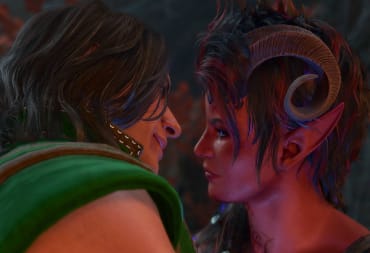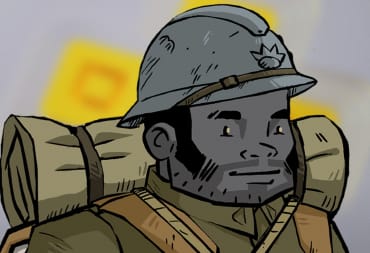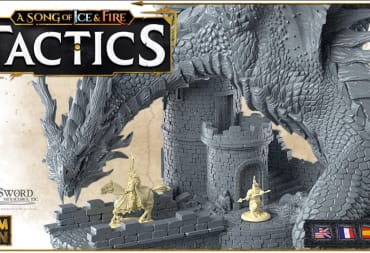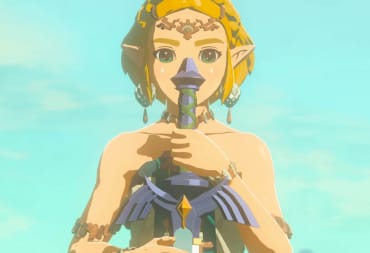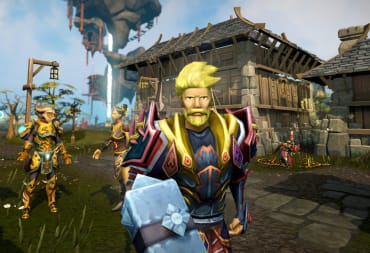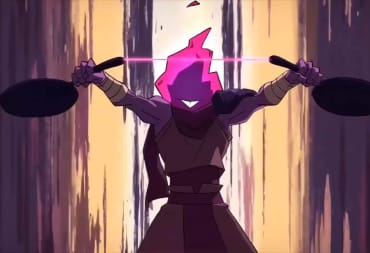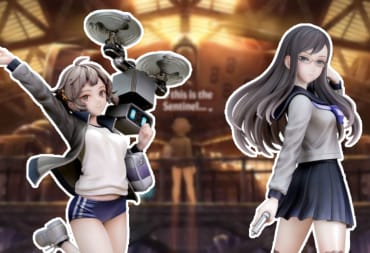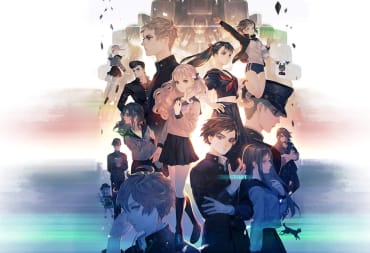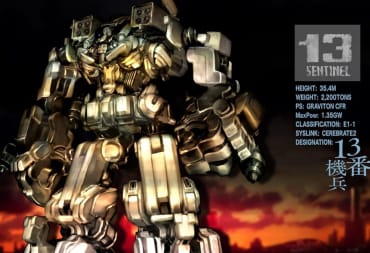When it comes to telling a story there's almost no incorrect way to do it. Whether you want to start at the beginning and go through linearly, or the end and flashback for relevant information. Forward or back, there are ways to tell the story so that everything lines up in order. A storytelling style that is less commonly used is one that feeds viewers different points of time with no rhyme or reason to where they fall in the plot.
This puts the viewers in the position of having to build up an image or timeline of the movie. The success of such a narrative isn't on how good the characters and plot are, but the viewer's ability to comprehend the pieces all together. 13 Sentinels: Aegis Rim takes the latter 'jigsaw puzzle' like approach to storytelling, but can Vanillaware pull it off at such a large scale?

13 Sentinels: Aegis Rim gameplay gets split into three different segments. In Remembrance, players will get to play through the individual stories of the 13 playable protagonists. Each has their own unique storyline, regularly intersecting with other characters. By completing each character's story you learn the culmination of events leading up to the Final Battle. The Destruction mode is the Final Battle itself. Each character piloting a giant robot Sentinel clashes against the Kaiju.
The final mode is Analysis, here is where you can look up information about characters and rewatch cutscenes. As you unwrap the story Analysis will continue to expand. Adding further to each entry as you discover more. The story is complex, and at times can be quite convoluted.
As more gets revealed about each character and their importance these clear entries do an incredible job of making sure the player doesn't get lost. While only having to check Analysis a few times to double-check some character relations this readily available tool is a wonderful addition.
The two gameplay modes, Remembrance and Destruction, are extremely distinct. The majority of the story gets played out in Remembrance. You explore each protagonist's world and interact with characters to progress the plot. Some of the characters are Juro Kurabe, a quiet high school kid from the '80s with a love of B-movies, Takatoshi Hijiyama, a newly enlisted soldier from the 1940s that was flung into the future, and Nenji Ogata, the typical high school Bancho picking fights with rival gangs.
Each of the 13 characters is unique and has their own well-defined story and development. Having 13 main characters is already a hard sell, each having their own story makes things complicated fast.

At the start of the game, the player gets given zero context as to what's happening. How are these kids are able to summon giant robots? Why is a boy from the 40s now in the 80s fighting kaiju? It's intentional that you start questioning so much so that as you progress through the 60-hour campaign you're wanting to continue seeking the answers.
he puzzle-like storytelling is further convoluted with 13 Sentinels' liberal use of time travel and other sci-fi plot points. When you finally feel like you have an understanding of what's going on the game will show you a flashback to a scene set in the future. Players get frontloaded with a torrent of information about characters, locations, and events throughout time. Like trying to drink water out of a firehose, this much information can easily overwhelm players at the beginning. It's difficult to make the recommendation but while the first 5 hours might be a struggle with so much new information, the next 50+ hours makes it worth it.
The puzzle of the story, once complete is one well worth experiencing. There's a certain level of satisfaction of playing through a character's story and playing the other side of a situation you've already seen. As more gets revealed the whole picture comes into focus. Instead of scrambling to figure out where an event falls into the timeline each new piece of information slots into what few gaps remain. You're getting excited with each revelation as your remaining questions are getting answered.
Each additional sci-fi trope adds a certain level of campiness to the story. You've got to roll with these revelations, otherwise, the seriousness of the game about its ever convoluted plot will begin to grind on you. Time travel, giant robots vs Kaiju, large four-legged "Hi-Quad" kaiju that get likened to Tripods of War of the Worlds. These tropes are spread all throughout the story of 13 Sentinels: Aegis Rim. It's a game that takes itself seriously, but that doesn't mean you have to. If you are more likely to roll your eyes at this kind of tropey and convoluted story though it's best to turn away now.

In terms of gameplay, Remembrance has you living out the lives of each character as they interact with their immediate surroundings. This means a lot of walking around the school they all go to, exploring different times, and conversing with other characters. While many of these segments don't allow for much deviation, some characters have diverging story threads. Players are forced to make different choices on each subsequent story session to get a new outcome.
Each of these plotlines ends with a cutscene revealing important information. As Juro Kurabe your story begins in the classroom at the end of the day. Your friend, Kyuta Shiba, wants to go play games at Shu Amiguchi's house, papers have been left on the lectern for the nurse's office, and some girls in your class are gossiping in the corner. Choices made will determine your path, and even open up new possibilities.
To drive players through the story as a character learns something of note it will get added to their Thought Cloud. Players can have the character ponder these phrases, or use them to prompt discussions about the topic with others. When searching for Shu around school you'll will head to the Cafeteria to try to track him down. If you instead use "Shu Amiguchi" in your Thought Cloud and talk to the girls in class one will tell you that he's in the Break Area. Now that "Break Area" is in your Thought Cloud you can tell Kyuta what you've learned and you'll head there instead.
The Thought Cloud does a great job of giving freedom to player's movements but still ensures that you don't miss anything important. At certain points, a character's story will get locked, and you'll need to clear a requirement elsewhere to progress. This ensures the big plot points get correctly delivered, instead of being brought up nonchalantly as if it's no big deal.

A particularly fantastic element of Remembrance is how great the pseudo-watercolor art style looks. Every aspect of the world looks absolutely breathtaking. In locations that you'll visit in both the 80s and 40s, the difference is immediately recognizable. Traveling to the "old" school building in the past and seeing the sheen on the wood as it was brand new compared to the dull well-worn building in the 80s helps stitch together an image of the changes that time has taken.
While each of the characters looks fantastic there is a bit of rigidity as they move through the world. In this 2D painted world, it's also amazing what Vanillaware has been able to do with lighting to create depth of scenes. Either from the bloom of a setting sun or the technological glow of monitors and the Sentinels themselves.
In what seems like a complete flip from the sci-fi slice of life anime that is Remembrance, Destruction swaps genre to become a strategy game. The main characters, now piloting their Sentinels for the Final Battle need to protect access points that the Kaiju are targeting. In each battle, you choose six out of your thirteen pilots to be active, while the remaining members will defend the terminal passively.
The missions are comprised of waves of Kaiju dropping into battle, your goal is to wipe them all out or outlast the clock. Don't let it being strategy dissuade you if you're not a fan or find strategy difficult in games. Even on normal difficulty there you'll find it easy to win missions, and will likely never get less than an S ranking.

13 Sentinels isn't a true RTS, but could be more closely likened to the earlier Final Fantasy ATB system. Each move that a Sentinel makes, either an attack or even physically moving, will take a certain amount of time to recharge. While selecting your action the rest of the battlefield gets paused. You might choose to hold your long-range Sentinels attacks for a new wave of enemies or start moving your close combat Sentinels to where they'll land.
Each new wave gets telegraphed by a large circle, you've got plenty of time to be ready for a new attack, even if from behind. Facing off against both land-based and flying Kaiju you get hints at the start of the battle what to expect. Picking your team for each battle is an important part of the process.

Sentinels come in four classes; close combat First Generations, Second Generation are all-rounders having a varied mix of close and long-range attacks, the Third Generation are long-range fighters, and the Fourth Generation Sentinels can fly offering improved mobility. Not all attacks can hit both flying or ground kaiju. While First Generation Sentinels have tricks to get flying enemies on the ground you need to make sure you have the right arsenal for that battle ahead. At the conclusion of each battle, you'll receive a score.
This is based on how quickly the mission was competed and the amount of damage dealt. Your score gets converted into points you can spend to give your Sentinels new and stronger abilities. These battles are fun and fast-paced never overstaying their welcome.
While Destruction takes place after Remembrance in the timeline of events it will also lock you out if you're not far enough in Remembrance. While the story gets spread out among all the characters these locks make sure big reveals are done right. Destruction acts as its own 14th storyline, after completing the other 13 and understanding the absolute chaos Destruction links them all together. It's the True Ending to finally wrap it all up. The culmination of all these events does a perfect job of wrapping up all the loose threads, while also hinting at their futures.

The biggest downfall of Destruction mode is in the way it's presented. Instead of getting to see the city on fire as the Sentinels move through the streets, it's all presented as a simulation or satellite view. The Sentinels are blue dots on the city grid, each Kaiju looks like 3D pixel art from classics like Space invaders. While the large pixel creature with four lines of dots spiraling off is clearly a Hi-Quad, it's so less satisfying viewing the battles this way.
Instead, this view capitalizes on an arcade approach. There's a big High Score counter in the bottom left and each attack sends up damage numbers. One thing that's lost in this portrayal is the weight and magnitude of watching giants duke it out. The closest we get to seeing the Mechs actually fight is the preview videos that appear when choosing an attack.
13 Sentinels: Aegis Rim is an absolute ride. If you're down to get deep into the red twine and cork boards about an anime sci-fi adventure this is for you. While the first few hours will be confusing and chaotic before long you'll be pushing through each storyline hunting for answers. The Thought Cloud system is a fantastic way to gradually give the player the ability to explore different parts of each character's story. It also serves as a way to give players an insight into the character's own thoughts.
While the narrative is chaotic it helps to keep everything in line and make sure the player doesn't lose their way. The strategy gameplay isn't particularly difficult but was an enjoyable experience nonetheless. It delivered something completely different to the almost point-and-click gameplay of Remembrance. The lackluster visuals in the strategy portions are quite a let down in comparison to what Vanillaware was able to achieve with Remembrance. The attempt at an arcade feel is still admirable. While 13 Sentinels: Aegis Rim does start off somewhat rocky the end result is one that is truly magnificent.
TechRaptor reviewed 13 Sentinels: Aegis Rim on PlayStation 4 using a copy provided by the publisher.
Review Summary
Pros
- Beautiful Visuals...
- Amazing Non-Linear Story
- Fun and Fast Combat
Cons
- ...Except for In Combat
Have a tip, or want to point out something we missed? Leave a Comment or e-mail us at tips@techraptor.net

